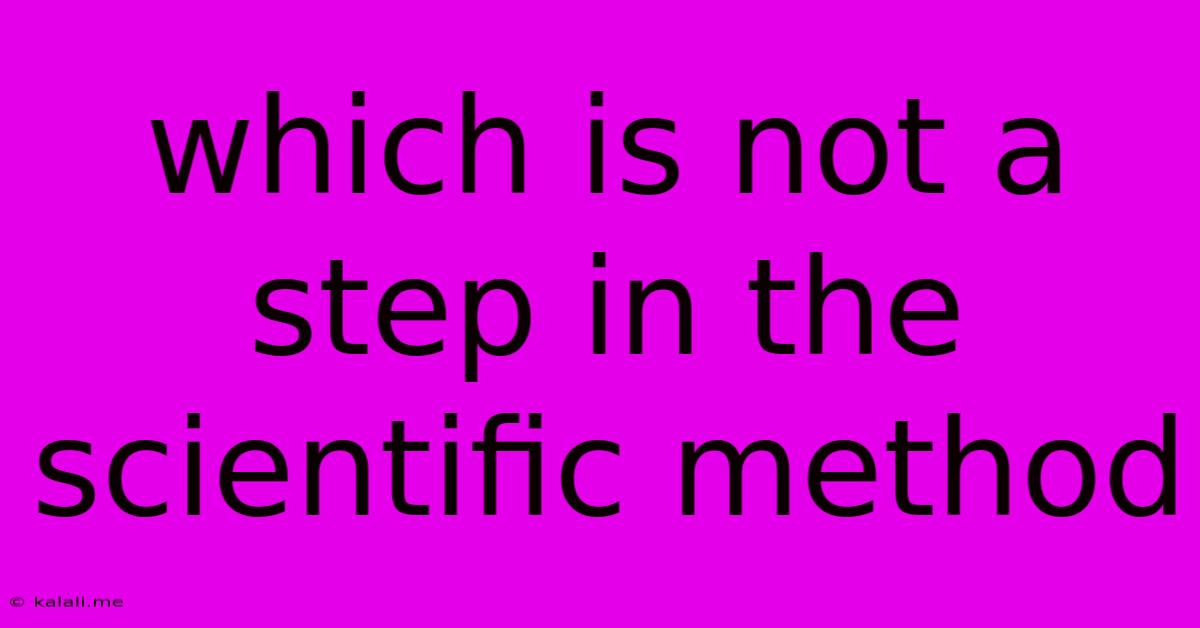Which Is Not A Step In The Scientific Method
Kalali
Jun 14, 2025 · 3 min read

Table of Contents
Which is NOT a Step in the Scientific Method? A Comprehensive Guide
The scientific method is a cornerstone of scientific inquiry, a systematic approach used to investigate and understand the natural world. While often simplified, it's a flexible process involving observation, hypothesis formation, experimentation, analysis, and conclusion. But what steps are not part of this rigorous process? This article will explore common misconceptions and clarify what doesn't belong in a true scientific investigation.
Understanding the Core Steps of the Scientific Method: Before we delve into what's not a step, let's briefly review the key components:
- Observation: Careful and detailed observation of a phenomenon or event. This often sparks curiosity and leads to questions.
- Question: Formulating a specific, testable question based on the observation. This focuses the investigation.
- Hypothesis: Proposing a tentative explanation or prediction to answer the question. This is a testable statement.
- Experiment: Designing and conducting a controlled experiment to test the hypothesis. This involves collecting data.
- Analysis: Analyzing the collected data to determine if it supports or refutes the hypothesis. This often involves statistical methods.
- Conclusion: Drawing a conclusion based on the analysis. This might lead to further investigation or refinement of the hypothesis.
- Communication: Sharing the findings with the scientific community through publications or presentations. This ensures transparency and allows for peer review.
Common Misconceptions and Steps NOT Included in the Scientific Method:
Several activities, while potentially related to science, are not integral steps within the formal scientific method. These include:
- Ignoring contradictory evidence: A core tenet of the scientific method is the willingness to revise or reject a hypothesis if evidence contradicts it. Ignoring contradictory data is a fundamental flaw. Scientists must embrace falsification – the possibility of proving a hypothesis wrong.
- Relying solely on anecdotal evidence: Anecdotal evidence, or personal stories, is insufficient to support a scientific claim. The scientific method requires rigorous, repeatable experiments with controlled variables and large sample sizes.
- Making assumptions without testing: Jumping to conclusions without testing a hypothesis through experimentation weakens any scientific claim. The scientific method demands evidence-based reasoning.
- Ignoring peer review: The scientific process includes peer review – the evaluation of scientific work by other experts in the field. Ignoring this crucial step can lead to flawed or biased conclusions.
- Failing to replicate results: Scientific findings must be reproducible. If an experiment cannot be replicated by other scientists, the results are questionable and do not contribute significantly to the body of scientific knowledge.
- Presenting biased or manipulated data: Data manipulation and the omission of negative results undermine the integrity of the scientific process. Honesty and transparency are paramount.
- Starting with a conclusion: A scientific investigation begins with a question, not a predetermined conclusion. The hypothesis should be formulated before the experiment, not after.
- Using only one method of investigation: A multifaceted approach often yields stronger results. Relying on a single method might limit the scope of understanding.
Conclusion:
The scientific method is a powerful tool for understanding the world around us. Its success hinges on its rigorous, evidence-based approach. Understanding what isn't a step in this method is as important as understanding what is. By avoiding the pitfalls outlined above, scientists ensure the reliability and validity of their findings and contribute meaningfully to our collective knowledge. Maintaining objectivity, embracing skepticism, and prioritizing reproducible results are crucial for adhering to the principles of the scientific method.
Latest Posts
Latest Posts
-
Which Of The Following Is A Current Transformer
Jun 14, 2025
-
Muscle Fatigue Is Caused By
Jun 14, 2025
-
Absolute Zero Corresponds To A Temperature Of
Jun 14, 2025
-
Which Country Is Lake Victoria In
Jun 14, 2025
-
Economics Can Be Best Defined As The Study Of
Jun 14, 2025
Related Post
Thank you for visiting our website which covers about Which Is Not A Step In The Scientific Method . We hope the information provided has been useful to you. Feel free to contact us if you have any questions or need further assistance. See you next time and don't miss to bookmark.